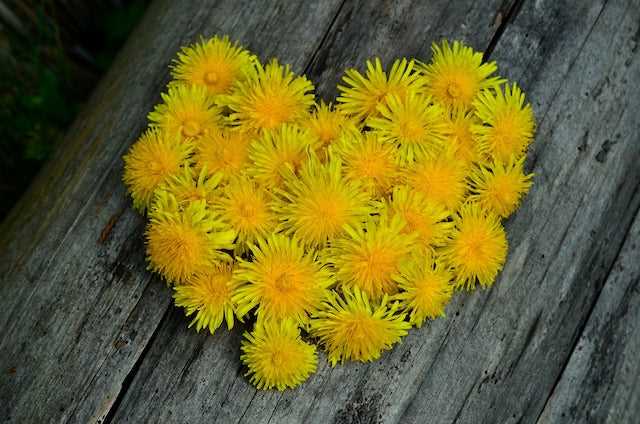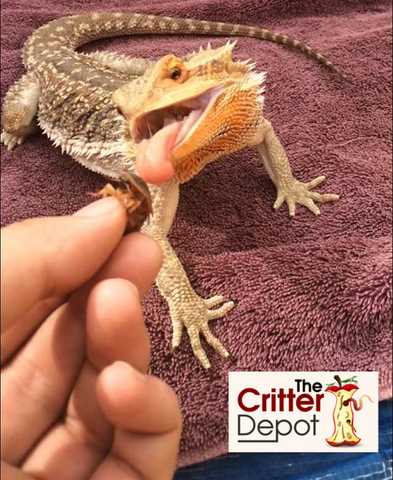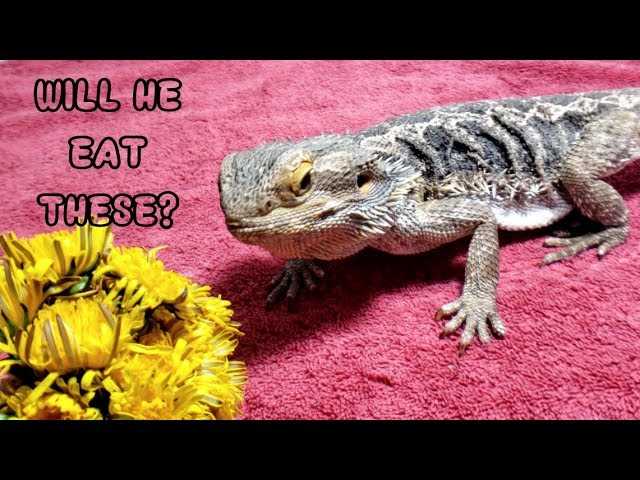
Bearded dragons are fascinating pets that require a varied and balanced diet to thrive. While their main diet consists of insects and leafy greens, many owners wonder if dandelions are safe for these reptiles to consume.
Dandelions are common weeds found in many backyards, and they are often considered a nuisance by gardeners. However, these yellow flowers and their leaves actually contain a variety of nutrients that can benefit a bearded dragon’s health.
Bearded dragons can eat dandelion greens in moderation. These leafy greens provide essential vitamins and minerals, such as vitamin A, vitamin C, and calcium, which are crucial for the overall well-being of a bearded dragon’s immune system, skin, and bones. Additionally, dandelion greens are rich in fiber, which aids in digestion and prevents constipation.
Nutritional Value of Dandelions for Bearded Dragons

Dandelions are a highly nutritious food option for bearded dragons. They offer a wide range of essential vitamins, minerals, and other nutrients that are beneficial for the overall health and well-being of these reptiles. Here is a breakdown of the nutritional value of dandelions:
| Nutrient | Amount per 100g |
|---|---|
| Protein | 2.7g |
| Fat | 0.7g |
| Carbohydrates | 9.2g |
| Fiber | 3.5g |
| Calcium | 187mg |
| Phosphorus | 66mg |
| Vitamin A | 5586IU |
| Vitamin C | 35mg |
| Vitamin K | 778mcg |
| Iron | 3.1mg |
As seen from the table above, dandelions are relatively low in protein and fat content but rich in carbohydrates and fiber. They also provide a good amount of calcium, which is essential for strong bones and proper muscle function in bearded dragons. Additionally, dandelions are a great source of vitamins A, C, and K, which are important for immune function, antioxidant protection, and blood clotting.
The iron content of dandelions is also noteworthy, as it contributes to the production of red blood cells and helps prevent anemia in bearded dragons. The high fiber content in dandelions promotes healthy digestion and prevents constipation, which can be a common issue in captive reptiles.
Health Benefits of Dandelions for Bearded Dragons

Rich in Nutrients

Dandelions are packed with essential nutrients that can support the overall health and well-being of your bearded dragon. They are a great source of vitamins, including vitamin A, vitamin C, and vitamin K. These vitamins are crucial for maintaining healthy skin, promoting proper growth, and supporting the immune system.
Dandelions also contain minerals such as calcium, phosphorus, and potassium, which are vital for strong bones, muscle function, and maintaining electrolyte balance. Including dandelions in your bearded dragon’s diet can help ensure they receive these essential nutrients.
Promotes Digestive Health
In addition to their diuretic properties, dandelions also have mild laxative effects. This can help promote regular bowel movements and prevent digestive issues such as constipation in bearded dragons. Including dandelions in their diet can contribute to a healthy digestive system.
Antioxidant and Anti-inflammatory Properties
Dandelions contain antioxidants that can help protect your bearded dragon’s cells from damage caused by free radicals. This can contribute to a stronger immune system and reduce the risk of certain diseases and conditions.
Furthermore, dandelions have anti-inflammatory properties that can help reduce inflammation in the body. This can be particularly beneficial for bearded dragons with joint issues or inflammatory conditions.
Potential Risks of Feeding Dandelions to Bearded Dragons
- 1. Pesticide and Chemical Exposure: Dandelions that have been treated with pesticides or chemicals can be harmful to bearded dragons. These substances can be toxic and may lead to health problems or even death. It is crucial to use organic dandelions or those that are grown in pesticide-free environments.
- 4. Oxalates: Dandelions contain oxalates, which can bind to calcium and form crystals. If bearded dragons consume excessive amounts of dandelions with high oxalate levels, it can interfere with calcium absorption and contribute to the development of metabolic bone disease.
- 5. Contamination: Wild dandelions can be contaminated with various substances, including pollutants or parasites. To minimize the risk of contamination, it is advisable to source dandelions from trusted suppliers or grow them in controlled environments.
It is crucial to consult with a reptile veterinarian or a qualified herpetologist to ensure that you are providing a safe and balanced diet for your bearded dragon. They can provide additional guidance and recommendations based on your pet’s specific needs and health conditions
Feeding Guidelines for Bearded Dragons
It is recommended to provide dandelions as a supplement to the main diet of your bearded dragons. They should not make up the majority of their diet, but rather serve as a healthy addition. Variety is key in a bearded dragon’s diet, so make sure to include other leafy greens, vegetables, and appropriate protein sources.
When offering dandelions to your bearded dragons, ensure that they are properly washed and free from any dirt or debris. Remove any wilted or damaged parts of the plant before feeding. Chop the dandelion leaves into smaller, bite-sized pieces to make it easier for your dragons to eat and digest.
Remember to introduce new foods gradually to avoid digestive upset. Offer small amounts of dandelions initially and observe your dragons’ response. If they show signs of bloating, diarrhea, or any other adverse reactions, discontinue feeding dandelions and consult with a reptile veterinarian.
Finally, always provide fresh, clean water for your bearded dragons to drink. Dandelions have a high water content, but it is still important to offer a separate water source to keep them hydrated.
By following these feeding guidelines, you can safely incorporate dandelions into the diet of your bearded dragons, providing them with essential nutrients and a diverse range of food options.
How to Prepare Dandelions for Bearded Dragons
- Choose fresh dandelions: Look for fresh dandelions that have not been treated with any chemicals or pesticides. It’s best to collect dandelions from areas that are free from pollution and away from roads.
- Wash thoroughly: Before serving dandelions to your bearded dragon, make sure to wash them thoroughly to remove any dirt or contaminants. You can soak them in water for a few minutes and then rinse them well.
- Remove flowers and stems: While bearded dragons can eat the entire dandelion plant, it’s recommended to remove the flowers and stems before feeding. These parts are less nutritious and can be difficult for the dragon to digest.
- Chop the leaves: After removing the flowers and stems, chop the dandelion leaves into small, bite-sized pieces. This will make it easier for your bearded dragon to eat and digest the greens.
- Offer fresh dandelions: Bearded dragons prefer fresh greens, so it’s best to offer dandelions to your pet soon after preparation. Avoid leaving them in the enclosure for too long to prevent spoilage.
By following these preparation guidelines, you can ensure that the dandelions you feed to your bearded dragon are safe, nutritious, and enjoyable for them to eat.

I’m Lena Adams—a product of an unconventional upbringing in the African wilderness. My father, a daring explorer of African wildlife, sparked my fascination with reptiles, a passion that intertwined with the tragic loss of my mother during an expedition, leaving an indelible mark on my life. Driven to understand the creatures that captivated my parents, I embarked on my journey, sharing insights about reptiles, frogs, and lizards on my website. Through my explorations and conservation efforts, I honour my family’s legacy while seeking connections—to the creatures, nature, and the mother whose presence I yearn to understand.
